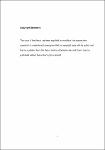Investigating opportunities for sustainability behaviours within Paramedic and Ambulance Service practice
| dc.contributor.supervisor | Nichols, Andrew | |
| dc.contributor.author | Allum, Peter | |
| dc.contributor.other | School of Nursing and Midwifery | en_US |
| dc.date.accessioned | 2023-04-05T13:33:35Z | |
| dc.date.available | 2023-04-05T13:33:35Z | |
| dc.date.issued | 2023 | |
| dc.identifier | 218797 | en_US |
| dc.identifier.uri | https://pearl.plymouth.ac.uk/handle/10026.1/20664 | |
| dc.description.abstract |
The National Health Service (NHS) is under increasing pressure to adopt radical strategies for change, in order to meet UK national targets of net zero emissions by 2050. This thesis aimed to explore and investigate sustainability behaviours of UK ambulance service personnel and how they contribute to a reduce, re-use, recycle (RRR) ethos. Phase one, a systematic literature review (n=114 studies) explored sustainability in Emergency Medical Services (EMS). Phase two phenomenological study explored the role and experiences of NHS ambulance strategic managers (n=6 participants) in England, when implementing their organisational Green Plans. Phase three ethnographical observation explored the sustainability activities, attitudes and behaviours of operational ambulance personnel within two English NHS ASTs (n= 66 participants). Phase one findings identified that rising global temperatures, caused by worldwide carbon emissions, will place an amplified demand on EMS, through an increase in morbidity and mortality rates. It also showed a dearth of empiric sustainability research involving UK ambulance services. Phase two findings revealed an insight into the Sustainability Managers’ challenges of implementing sustainability policy, the factors that incentivise change, staff resistance and tactics to overcome it, short-term and long-term aims, and their opinions with future objectives. Phase three observational findings discovered a diversity of sustainability attitudes and behaviours amongst the staff, where three behavioural groups were identified: firstly, those who were already sustainability pro-active, secondly, those who were willing in attitude, but lacked the facilities, resources, support or means to apply behavioural changes in their practice and finally, those yet to be convinced to adjust towards sustainability behaviours. This thesis provides an original and valuable insight into the sustainability and carbon reduction strategies employed within EMS organisations. Further opportunities may be generated from the findings, which could lead to cost savings across other EMS settings and the wider business communities globally. | en_US |
| dc.language.iso | en | |
| dc.publisher | University of Plymouth | |
| dc.rights | Attribution-NonCommercial-NoDerivs 3.0 United States | * |
| dc.rights.uri | http://creativecommons.org/licenses/by-nc-nd/3.0/us/ | * |
| dc.subject | Paramedic | en_US |
| dc.subject | Sustainability | en_US |
| dc.subject | carbon footprint | en_US |
| dc.subject | climate change | en_US |
| dc.subject | sustainable behaviours | en_US |
| dc.subject | sustainable behaviors | en_US |
| dc.subject | healthcare waste | en_US |
| dc.subject | emergency medical service | en_US |
| dc.subject | ambulance service | en_US |
| dc.subject.classification | PhD | en_US |
| dc.title | Investigating opportunities for sustainability behaviours within Paramedic and Ambulance Service practice | en_US |
| dc.type | Thesis | |
| plymouth.version | non-publishable | en_US |
| dc.identifier.doi | http://dx.doi.org/10.24382/5014 | |
| dc.identifier.doi | http://dx.doi.org/10.24382/5014 | |
| dc.rights.embargoperiod | No embargo | en_US |
| dc.type.qualification | Doctorate | en_US |
| rioxxterms.version | NA |
Files in this item
This item appears in the following Collection(s)
-
01 Research Theses Main Collection
Research Theses Main



